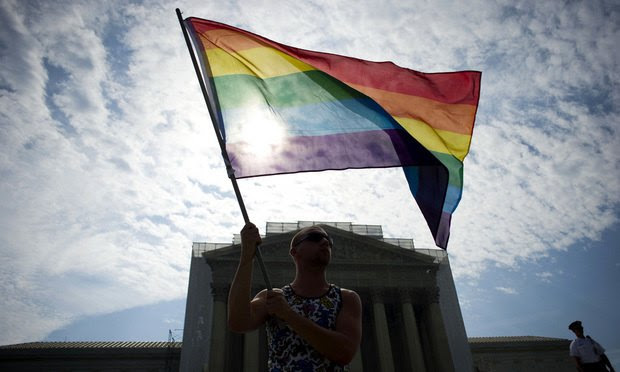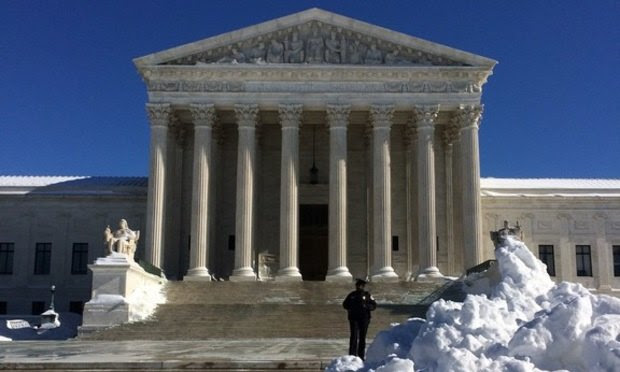What's On Walter Dellinger's Mind | Crowdfunded Amicus Briefs Name Donors | LGBT Cases Set for Jan. 4 Conference
O'Melveny's Walter Dellinger tees up his expectations for the new year about Trump-focused disputes the Supreme Court could hear.... Plus: We've got an update on previously anonymous GoFundMe amicus brief backers. And there are some big LGBT cases on the court's Jan. 4 conference. Thanks for reading -- and happy new year!
January 03, 2019 at 07:00 AM
8 minute read
Happy New Year! After a long respite, the justices are gearing up for the January argument cycle, which is not chock-full of marquee cases. But 2019 could still be a blockbuster term—several cases on the Jan. 4 conference are catching attention—and former acting SG Walter Dellinger tells us why. Also, the latest on how GoFundMe-backed amicus briefs are being retooled to fit the court's rules. Thanks for reading, and we welcome feedback at [email protected] and [email protected].

Will Trump Cases Overshadow SCOTUS Docket?
Former acting U.S. Solicitor General Walter Dellinger has become a prolific tweeter. And with his experience as a partner at O'Melveny & Myers, veteran Supreme Court advocate and Duke University School of Law emeritus professor, when Dellinger tweets, people listen. Just before the end of 2018, he posted a thread that spotlighted the Trump-related litigation that may make its way to the high court in 2019.
Dellinger wrote in his thread on Twitter: “Will 2019 be the year that Trump cases are expedited to the US Supreme Court, dominating its term? In addition to the sealed subpoena for a foreign company's records, the court could hear on a fast track any of a half dozen potential Trump cases.” Among them, according to Dellinger:
➤ A grand jury subpoena for the president's testimony
➤ U.S. House subpoenas for Mueller's report and Trump's tax returns
➤ Whether a president can be indicted or be named an unindicted co-conspirator
➤ Whether the president can postpone civil suits
➤ Whether the president is violating the emoluments clause
➤ Whether the New York attorney general can bring charges against the Trump Foundation
Dellinger wrote: “I do not believe such cases will divide the Supreme Court on partisan lines. I think that most justices will resist extravagant claims of presidential power and immunity from legal process. But I could be wrong, as I was about Bush v. Gore.”
We caught up with Dellinger over the holidays to ask him to elaborate a bit. Some of his observations:
>> “It would be a mistake to assume that these cases would not come to the court for a very long time.” He adds: “We don't know for sure these cases will come to the Supreme Court in 2019, but I am sure the justices are girding themselves for that possibility.”
>> That's partly because the solicitor general has tried several times to expedite cases, a practice that “runs the risk of offending both the courts of appeals and the Supreme Court.”
>> “I think the Supreme Court does not like these requests” to expedite cases, Dellinger said, because the traditional slower path “distances the court, in time, from political clashes.”
>> Don't assume that Trump's appointees will vote Trump's way, Dellinger said. “If you are going to be on the court for 40 years, you want to make a good first impression,” he said.

Job Bias Petitions on First Conference of 2019
Four major cases involving job discrimination are on our watch list for the justices' first conference of the new year on Jan. 4.
>> Three of the four cases ask the justices to decide whether Title VII's ban on workplace discrimination because of “sex” includes sexual orientation or gender identity discrimination.
U.S. Solicitor General Noel Francisco filed an amicus brief arguing that Title VII of the Civil Rights Act of 1964 does not prohibit employers from discriminating on the basis of sexual orientation. That position is consistent with a memo issued in 2017 by then-Attorney General Jeff Sessions. But it is inconsistent with the litigating position taken by the Equal Employment Opportunity Commission.
The three cases are R.G. v. G.R. Harris Funeral Home v. EEOC; Altitude Express v. Zarda and Bostock v. Clayton County, Georgia.
>> The fourth case on our radar is also being watched closely by employers and civil rights groups. In Yovino v. Rizo, the high court is asked whether the federal Equal Pay Act is violated when an employer uses prior salary history as a reason to pay a woman less than a man for the same work. This case is from the U.S. Court of Appeals for the Ninth Circuit and was an opinion by the late Judge Stephen Reinhardt.
Jones Day partner Shay Dvoretzky is counsel to Fresno County Superintendent of Schools Jim Yovino. Representing Aileen Rizo is Daniel Siegel, partner in Siegel, Yee & Brunner in Oakland, California.

Crowd-funded Amicus Briefs Name Their Donors
In November, we first reported a new trend in the Supreme Court's amicus practice: crowd-funding the cost of paying for an amicus brief through GoFundMe campaigns. Not only does crowdfunding help financially, but it also engages and rallies supporters of whatever cause the amicus organization is espousing.
But last month, we reported a hitch: the Supreme Court's rule 37.6, which requires that amicus groups identify all donors who gave money to finance a brief. That posed a problem because GoFundMe allows anonymous donors to contribute.
After the court clerk's office affirmed that there was a problem, one brief in the upcoming case of Tennessee Wine & Spirits Retailers Association v. Byrd dealt with it by revising its submission. The U.S. Alcohol Policy Alliance brief added a footnote that listed the names of GoFundMe donors who identified themselves, and the alliance returned the donations of anonymous donors who wanted to remain anonymous.
We've learned that another GoFundMe-supported brief in the same case, filed by “81 Wine Consumers,” took a somewhat different approach. It added an appendix to the brief listing the names of the GoFundMe donors, also stressing that “No anonymous contributions were used to fund any costs of the preparation or submission of this brief.”
What did the amicus group behind the brief do with the anonymous donations it received through GoFundMe?
“We contacted all anonymous donors and most agreed to be identified on the brief. The others agreed to let their contributions be used to offset litigation expenses in other cases concerning consumer access to wine,” said Tom Wark, executive director of the National Association of Wine Retailers.

What We're Reading: Supreme Court Headlines
>> “Conquerors of the courts.” A deep-dive on the Federalist Society's impact on the law. “The conservative and libertarian society for law and public policy studies has reached an unprecedented peak of power and influence.” [The Washington Post]
>> A Mueller grand jury dispute? The justices are poised any minute now to rule on a grand jury subpoena dispute that has apparent ties to Special Counsel Robert Mueller's investigation. [CNN]
>> Rushing to the high court… “In a wide array of politically charged disputes, the Trump administration's top courtroom lawyer, Solicitor Gen. Noel Francisco, has repeatedly gone directly to the Supreme Court, short-circuiting federal appeals courts to seek quick relief when district judges block the president's policies. [Los Angeles Times]
>> … Could have consequences: ”The Trump administration's disregard for protocol could also backfire, if the justices decide that they simply don't want to be rushed.” [FiveThirtyEight]
>> Ginni Thomas in the spotlight: ”Does it matter that the spouse of a Supreme Court justice is sharing such nakedly partisan, erroneous propaganda? Or have we hit the point at which this kind of rhetoric has been so normalized that, well, why wouldn't a prominent party activist be doing this?” [The Washington Post]
>> Reform watch: ”Judicial leaders have been gathering recommendations for possible reform, and an overriding question for 2019 is what steps—minimal or meaningful—the policy-making US Judicial Conference, led by Chief Justice John Roberts, might take to improve the system and instill confidence.” [CNN]
>> From a Kavanaugh misconduct complainant: “Kavanaugh's elevation to the Supreme Court did not render moot the questionable behavior that helped win him that seat. Nor is remedial action impossible now that Judge Kavanaugh is Justice Kavanaugh.” [The Washington Post]
This content has been archived. It is available through our partners, LexisNexis® and Bloomberg Law.
To view this content, please continue to their sites.
Not a Lexis Subscriber?
Subscribe Now
Not a Bloomberg Law Subscriber?
Subscribe Now
NOT FOR REPRINT
© 2025 ALM Global, LLC, All Rights Reserved. Request academic re-use from www.copyright.com. All other uses, submit a request to [email protected]. For more information visit Asset & Logo Licensing.
You Might Like
View All
Court Overturns $185M Fee Award for Quinn Emanuel in ACA Litigation

The Supreme Court Leaker That Never Was | This Term's 1st Opinion | Attorney-Client Privilege
9 minute read
Who's Arguing at the Lectern | Union-Busted Cement Trucks | Emergency Application Catch Up
9 minute read
Is It Legal Advice or Business Advice? | What Chief Justice John Roberts Didn't Say
Trending Stories
Who Got The Work
J. Brugh Lower of Gibbons has entered an appearance for industrial equipment supplier Devco Corporation in a pending trademark infringement lawsuit. The suit, accusing the defendant of selling knock-off Graco products, was filed Dec. 18 in New Jersey District Court by Rivkin Radler on behalf of Graco Inc. and Graco Minnesota. The case, assigned to U.S. District Judge Zahid N. Quraishi, is 3:24-cv-11294, Graco Inc. et al v. Devco Corporation.
Who Got The Work
Rebecca Maller-Stein and Kent A. Yalowitz of Arnold & Porter Kaye Scholer have entered their appearances for Hanaco Venture Capital and its executives, Lior Prosor and David Frankel, in a pending securities lawsuit. The action, filed on Dec. 24 in New York Southern District Court by Zell, Aron & Co. on behalf of Goldeneye Advisors, accuses the defendants of negligently and fraudulently managing the plaintiff's $1 million investment. The case, assigned to U.S. District Judge Vernon S. Broderick, is 1:24-cv-09918, Goldeneye Advisors, LLC v. Hanaco Venture Capital, Ltd. et al.
Who Got The Work
Attorneys from A&O Shearman has stepped in as defense counsel for Toronto-Dominion Bank and other defendants in a pending securities class action. The suit, filed Dec. 11 in New York Southern District Court by Bleichmar Fonti & Auld, accuses the defendants of concealing the bank's 'pervasive' deficiencies in regards to its compliance with the Bank Secrecy Act and the quality of its anti-money laundering controls. The case, assigned to U.S. District Judge Arun Subramanian, is 1:24-cv-09445, Gonzalez v. The Toronto-Dominion Bank et al.
Who Got The Work
Crown Castle International, a Pennsylvania company providing shared communications infrastructure, has turned to Luke D. Wolf of Gordon Rees Scully Mansukhani to fend off a pending breach-of-contract lawsuit. The court action, filed Nov. 25 in Michigan Eastern District Court by Hooper Hathaway PC on behalf of The Town Residences LLC, accuses Crown Castle of failing to transfer approximately $30,000 in utility payments from T-Mobile in breach of a roof-top lease and assignment agreement. The case, assigned to U.S. District Judge Susan K. Declercq, is 2:24-cv-13131, The Town Residences LLC v. T-Mobile US, Inc. et al.
Who Got The Work
Wilfred P. Coronato and Daniel M. Schwartz of McCarter & English have stepped in as defense counsel to Electrolux Home Products Inc. in a pending product liability lawsuit. The court action, filed Nov. 26 in New York Eastern District Court by Poulos Lopiccolo PC and Nagel Rice LLP on behalf of David Stern, alleges that the defendant's refrigerators’ drawers and shelving repeatedly break and fall apart within months after purchase. The case, assigned to U.S. District Judge Joan M. Azrack, is 2:24-cv-08204, Stern v. Electrolux Home Products, Inc.
Featured Firms
Law Offices of Gary Martin Hays & Associates, P.C.
(470) 294-1674
Law Offices of Mark E. Salomone
(857) 444-6468
Smith & Hassler
(713) 739-1250






